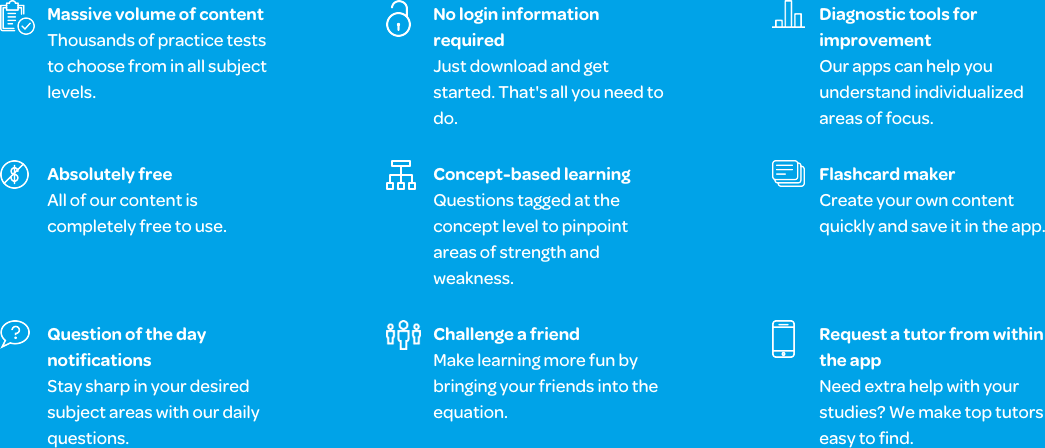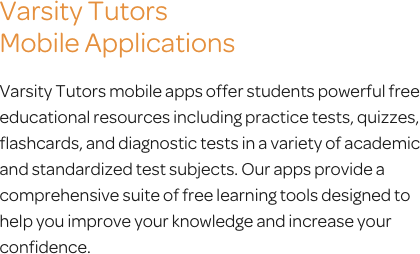The Varsity Tutors GRE Literature In English Mobile App
If you are intending to study an advanced degree related to English or Literature, you might need to take the GRE Subject Test in English Literature. Preparing for this standardized test can be overwhelming and stressful for a lot of people. Fortunately, Varsity Tutors’ Learning Tools can help you get the assistance you need to prepare for test day. If you are someone who can benefit from study sessions that can be conducted around your busy schedule and while you’re on the go, then you should consider downloading the Varsity Tutors GRE Subject Test in English Literature app. This program is available in the Google Play Store and iTunes, and it can provide users with a balanced learning plan that can help them prepare for the exam.
The GRE Subject Test in English Literature app covers all of the material that will be present on your upcoming exam. By accessing the Learn by Concept feature, you are able to use an interactive syllabus that covers subjects like American and British prose, the history and theory of literary criticism, and various other subjects. Here, you can review or learn the same way you would through a textbook and work towards understanding a variety of concepts that might give you trouble.
If you are interested in learning a little bit every day, consider the Question of the Day. This feature provides a different question each day, and it covers different topics that are on the exam. You can learn about plays from around the world and different types of poetry, and you can even test your knowledge in literary analysis. It is an excellent way for you to get a quick study session or work to learn something new each day. For a more comprehensive review, consider studying with the flashcards. Each deck of flashcards is arranged by topic, so you can easily select the areas that you want to really focus your time studying.
Once you feel that you have spent ample time reviewing, you can then test your knowledge of the GRE Subject Test in English Literature through the practice tests. You are free to access one of the many shorter, subject-specific practice tests. Not only are they a great way for a quick study session, they also give you the opportunity to focus on different topics rather than take the overall test. If you want to see how you would fare on the actual test, take the Full-Length Practice Test. This test is comprehensive and is much longer in length. It is designed to simulate an actual exam, and it is an ideal way to help you prepare for the upcoming test. Both practice tests come with a detailed results page, as well as an answer key that gives you detailed explanations for how the correct answers were reached. They also tell you how long it took to answer each question and to take the test as a whole, as well as give a comparison of how you scored relative to others who took the test.
By incorporating the Varsity Tutors GRE Subject Test in English Literature app into your study regimen, you are able to benefit from a more balanced study program. You can download it for your iPad, iPhone, or Android device, and use it any time that is convenient for you.
66 mobile apps to choose from for your tutoring needs.

Learn More
The GRE Literature in English Subject Test evaluates your potential as a graduate student pursuing an English Studies program. This is one of the many GRE Subject Tests you can take, which may or may not be required by your school of choice. Your score is used to determine your knowledge of the concepts you need to be familiar with in order to meet expectations in your college-level classes. Your score is compared against other students in various colleges and programs to get an idea of your capabilities and weaknesses. These tests can help you plan for your future classes or get into specific ones. One tool you can use to prepare for this test is the GRE Literature in English app from Varsity Tutors, available free from iTunes and the Google Play Store.
Though the specific questions on the GRE Literature in English Subject Test change every year, there are some things that remain the same. The 230 questions on the exam delve into a variety of literature topics, including the history of English, criticism, biography, literary theory, drama, and short story. You may be tasked with analyzing a short piece as a whole, or a lengthy piece in portions. There are major works on the exam pulled from the US, the British Isles, and many other areas. The test is split into specific categories of questions that call on your knowledge of literary analysis, identification, cultural and historical contexts, and the history and theory of literary criticism.
You will be asked questions about various genres, relationships, meanings, authors, movements, and works that relate to critical and factual questions. It is important that you have an understanding of addressing these two types of questions. Factual questions can require a number of abilities. You might be asked to determine the author or period of a work, or identify a critical comment, literary characteristic, or movement. Meanwhile, critical questions call for perceptive reading while you examine poetry or prose. You must be able to draw meaning, identify techniques, and note the structure of each piece while discussing the aspects of English.
The literary analysis section of the GRE Literature in English Subject Test spans between 40 and 55 percent of the exam. In this portion, you will need to be capable of interpreting written pieces and passages. You must be able to demonstrate a proficiency in recognizing and comprehending genres, as well as the ability to infer meaning, identify grammatical structures, and note literary techniques. Furthermore, you’ll answer questions that pertain to conventions, tone, allusions, and rhetorical strategies that an author might use to convey their point. You will need to be able to take advantage of reading strategies to delve into this and other sections efficiently. You can practice these strategies and others when you download the Varsity Tutors GRE Literature in English app for iPhones, iPads, and Android-powered devices.
Some of the questions of the exam will focus heavily on your ability to identify and recognize certain aspects of different literary works and periods based specific characteristics of the text. You will be given a passage to read thoroughly before responding to a series of questions related to the passage. You might see questions that require you pick apart the piece to determine its time period, title, or author. In order to this, you must be familiar with a wide range of theories, styles, and historical knowledge for each literary time period. While some of the works used in the exam may be unfamiliar to you, there are strategies that you can implement to identify the author or period based on what you understand about different characteristics of the piece. This section takes up 15 to 20 percent of the test.
Twenty to 25 percent of the GRE Literature in English Subject Test focuses on historical and cultural contexts in a broad way. You may see questions that ask you to use a critical statement to identify a work or biographical piece to determine an author. In addition, there will be questions that delve into the cultural, literary, and intellectual histories of a given text. You may need to determine the main theme and how it relates to the time period, or provide your own criticism of a piece alongside an explanation that draws on cultural standards. You may see questions that ask you to identify a specific character, setting, or plot.
The final section of the exam focuses on the history and theory of literary criticism. It is important that you have an understanding of these specific concepts to succeed. Literary criticism is a series of ideas and assumptions that are the basis upon which one explains and interprets a particular text. This is a more abstract concept that is used to describe the underlying characteristics people identify while trying to understand something. The questions you will face focus on the connection between a piece and its author, such as gender, race, or class, that is used to analyze themes in their work. You might answer questions that ask you how a piece may help or hinder a culture, or you may need to identify theoretical approaches to literary criticism.
Just as each section spans a percentage of the test, the scope of its literary-historical aspects are distributed as well. Five to 10 percent of the questions pertain to classical, continental, and comparative literature up to 1925. Twenty-five to 30 percent covers British literature up to 1660, which includes Milton. British literature from 1660 to 1925 takes up 25 to 35 percent of the exam. American literature until 1925 spans 15 to 25 percent. Finally, American, British, and World literature following 1925 take up the remaining 20 to 30 percent. Each of these has their own importance in your potential college-level classes. Full-length practice tests and other free preparatory tools are included in the free Varsity Tutors GRE Subject Test in Literature in English app for iPhone, iPad, and Android.
The examiners for the GRE Literature in English Subject Test use your exam scores to determine if you are prepared for a graduate program. While the exam is rarely required, unless you are hoping to get into a specific literature program, it can help you show off your excellent skills and understanding of the English language. Get yourself prepared to put your best foot forward on the exam by downloading Varsity Tutors’ free GRE Literature in English app, available from iTunes and the Google Play Store.




